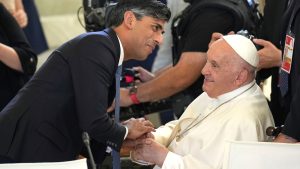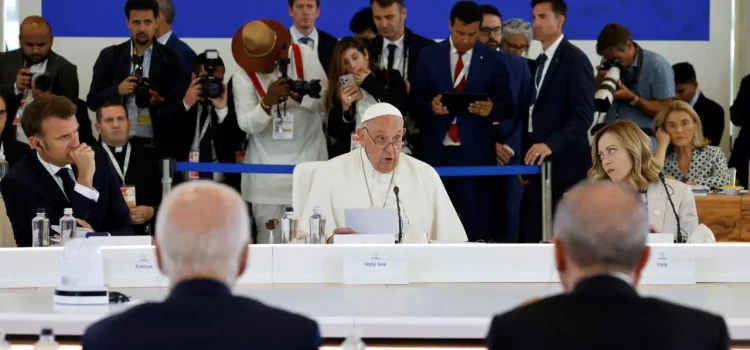
Pope Francis made history as the first pontiff to address the G7 summit, held in Italy’s Puglia region. His address centered on the ethical implications and future impact of artificial intelligence (AI), urging global leaders to approach its development with caution and responsibility.
Addressing the G7 Summit
As Pope Francis entered the summit room in his wheelchair, a hush fell over the gathered world leaders. He greeted each leader personally, including President Biden, President Zelenskyy, and Rishi Sunak. The Pope received warm welcomes from figures like Argentinian President Javier Milei and a hug from Jordan’s King Abdullah, illustrating the significance of his presence.
The Promise and Perils of AI
In his address, Pope Francis acknowledged the “epochal transformation” driven by AI, citing its exponential advances in scientific research. While recognizing its potential benefits, he cautioned that AI must not compromise human dignity or autonomy. He emphasized the need for robust human control over AI systems to prevent them from usurping individual decision-making.
Safeguarding Human Dignity
The Pope warned against a future where people are deprived of the ability to make autonomous choices, relegated instead to decisions made by machines. He stressed that human dignity hinges on preserving the freedom to make personal choices and opposed any scenario where AI systems could autonomously decide matters as critical as taking human life.
Ethical Development of AI

Pope Francis echoed themes from his annual peace message, advocating for an international treaty to guide the ethical development of AI. Such guidelines, he argued, should uphold values of compassion, morality, and respect for human rights. This call resonates amidst global debates on regulating AI to ensure it aligns with ethical standards.
Global Issues on the G7 Agenda
The G7 summit, attended by leaders from Canada, France, Germany, Italy, Japan, the UK, and the US, addressed pressing global issues beyond AI. Day one saw renewed commitments to support Ukraine in its conflict with Russia, highlighting geopolitical tensions. Other agenda items included discussions on migration from Africa, a concern for Italy, as well as addressing the Gaza conflict and tackling climate change.
Inclusivity and Outreach
In a bid for broader representation, leaders from India, Brazil, Turkey, Algeria, Kenya, and Tunisia were also present at the summit, collectively representing significant global populations. This inclusivity underscores the summit’s aim to foster dialogue and cooperation on a diverse range of global challenges.
Conclusion
As the summit progresses, Italy’s Prime Minister Giorgia Meloni hosted an informal dinner, fostering further exchanges among leaders. The final session will feature a press conference to outline the summit’s outcomes, reflecting the shared commitments and diverse perspectives articulated during this pivotal gathering.
In sum, Pope Francis’s address at the G7 summit marks a pivotal moment in global discussions on AI ethics, emphasizing the need for responsible governance to safeguard human values in an increasingly technological world. His message resonates beyond the confines of this summit, shaping international discourse on the future of AI and humanity.










